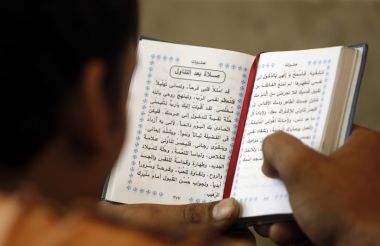Religious freedom under threat worldwide as abuses increase, US says

Last year saw some of the most "egregious abuses of religious freedom and other human rights," the US State Department concluded in a report released yesterday.
The 2014 International Religious Freedom Report found increasing restrictions on religious liberty in many countries around the world. Secretary of State John Kerry told a news conference that non-state actors are the "principal persecutors and preventers of religious tolerance and practice."
He referred to Islamic State by its Arabic name, Daesh, specifically mentioning al-Qaeda, al-Shabab and Boko Haram, as well. "All have been guilty of vicious acts of unprovoked violence. Children have been among the victims," Kerry said.
The suppression of religious freedom by these non-state actors is "destroying religious diversity", the report found. Analysing almost 200 countries and territories worldwide, it said that religious minorities were "disproportionately affected" in the Middle East, Sub-Saharan Africa and Asia.
"In these regions, religious intolerance and hostility, often toxically mixed with political, economic and ethnic grievances, frequently turned violent, resulting in death, injuries and displacement," the State Department said.
Governments were also scrutinised by the report, which found "a continuation of many restrictive governmental policies affecting religious freedom". It highlighted blasphemy and apostasy laws, prohibitions on conversion and the criminalisation of religious expression, in particular, in addition to the "stringent or discriminatory application of registration requirements for religious organisations".
Kerry said true religious freedom extends beyond tolerance, and is grounded in respect for the rights and beliefs of all people. "The message at the heart of this report is that countries benefit when their citizens fully enjoy the rights to which they are entitled. And this is not a hopeful theory; this is a proven reality," he added.
"No nation can fulfil its potential if its people are denied the right to practice, to hold, to modify, to openly profess their innermost beliefs."
He said religious bigotry is present to some degree in every country, including the US, and that everyone has a responsibility to work against it. He also called for the release of those detained for their religious beliefs, including Zhang Kai, a Chinese Christian human rights lawyer arrested in August.
David Saperstein, Ambassador-at-Large for International Religious Freedom, told reporters that restriction on religious liberty is a growing problem globally. "In far too may countries people face daunting, alarming, growing challenges on account of their beliefs," he said.
"In countries where once proud traditions of multi-faith cooperation, positive coexistence was the norm, we have witnessed growing numbers of religious minorities being driven out of their historic homelands...This report gives a voice to all those around the world who are seeking to peacefully live their lives in accordance with their conscience or religious beliefs."
Like Kerry, Saperstein specifically condemned ISIS and Boko Haram, and criticised blasphemy laws in Pakistan, Saudi Arabia, Egypt and Sudan. Repressive governments came under fire for their detention of prisoners of conscience. Saperstein said the US is "deeply committed to seeing such individuals freed everywhere in the world."
The ambassador ended on a word of hope. "While the challenges are daunting, we are deeply inspired by the work of countless religious communities, civil society organizations, and individuals around the world working alongside us to ensure that their governments live up to their international commitments to protect freedom of religious and belief," he said.
"We dedicate our work to their struggle and continue to fight for a world in which every individual is free to live out the core of his or her conscience."











